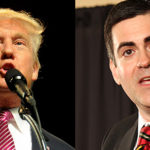WASHINGTON (RNS)—For Russell Moore, whose sharp criticisms of Donald Trump voters nearly cost him his job as the public voice for America’s largest Protestant denomination, the path to regaining a prophetic platform is just beginning.
Moore started down that trail recently when he apologized for being “unnecessarily harsh” during the presidential campaign, and he received a vote of confidence from the executive committee of the Ethics and Religious Liberty Commission, the public policy arm of the Southern Baptist Convention.
Moore, the ERLC’s president, also apologized individually to at least seven prominent Baptists who felt he had mismanaged his public platform, according to Southern Baptist and Trump campaign adviser Johnnie Moore (no relation).
“The gesture of unity was absolutely real,” Johnnie Moore said. “The warning shot that Moore was sent was also real, it was intentional, it was effective, and I don’t believe it will be forgotten.”
Groundswell of discontent
But observers say winning over the denomination’s brass is only the first step. More challenging will be to diffuse a groundswell of grassroots discontent among a sizable segment of the nation’s 15.3 million Southern Baptists, represented by a host of congregations that are refusing to send money to the SBC until they get the changes they want.
“Moore does not represent the ethical and political commitments of Southern Baptists who are tied not only to the Republican Party but to Trump’s presidency,” said Bill Leonard, a former Southern Baptist and professor of Baptist studies at Wake Forest University School of Divinity. “That seems to be what these churches are saying that want Moore’s dismissal and are withholding money.”
Leonard also doubts Moore can be an effective advocate on issues from refugees to the Confederate flag if he must tread gingerly to avoid offending Southern Baptists. His days as the SBC’s firebrand might already be behind him.
“His wings are clipped, and they might get amputated,” Leonard said. “If he stays, he is certainly neutered on many of these issues. He’s got to be silent. He can only primarily speak out on issues that the Republicans and Trump administration would promote.”
Sign up for our weekly edition and get all our headlines in your inbox on Thursdays
Strong backing in some quarters
But Moore, 45, is no pariah in the SBC. He enjoys strong backing with various constituencies, especially people under 50 and racial minorities, according to Barry Hankins, professor of history at Baylor University and author of Uneasy in Babylon: Southern Baptist Conservatives and American Culture.
Moore also has support among theologically conservative power brokers, who appreciate his stance on salvation—only for God’s elect—and unwavering opposition to abortion and gay marriage.
In him, some see a champion for a renewed religious right with more room for advocacy on social justice issues such as poverty and race relations that are important to younger Baptists who hold the keys to the denomination’s future, according to Hankins.
“These new evangelicals, the younger generation led by Russell Moore, see a danger in getting too close to the Republican Party, because they will lose their prophetic voice,” Hankins said. “They’re saying: ‘We want to reclaim what it means to be evangelical. It’s not a political position. It’s a theological position.’”
Moore declined to comment through a spokesperson, as did ERLC Chairman Ken Barbic.
Caused a stir during campaign
During the 2016 campaign, Moore caused a stir by turning his critiques on his fellow evangelicals who stood by Trump to the end. He summed up concerns in a January essay in First Things: “The crisis before us now is not that many among the national religious right’s political establishment have endorsed a candidate, but that they also ignored or downplayed some of the most morally troublesome questions of personal character and, for instance, issues of torture and war crimes, an embrace of an ‘alt-right’ movement of white identity ethno-nationalism and anti-Semitism, along with serious matters of sexual degradation towards women.”
Not since 2000 has the SBC faced such a trend of congregations withholding funds in protest, according to Roger “Sing” Oldham, spokesman for the SBC Executive Committee.
In February, the SBC launched an ad hoc committee to research how many congregations are holding back money, to find out why and to seek “redemptive solutions” that will get cash flowing to national offices again.
Moore’s fate rests in the hands of ERLC trustees. Their organizational structure provides some independence from other branches of the denomination. But congregations want more accountability from the ERLC.
Some churches withhold funds
One of the SBC’s largest congregations, Prestonwood Baptist Church in Plano, vowed in February to temporarily escrow its $1 million yearly offering in protest of “various significant positions taken by the leadership of the Ethics & Religious Liberty Commission.”
In a tweet, Prestonwood Pastor Jack Graham called Moore’s recent public apology “gracious and unifying.” But in response to a query, he declined to say whether giving to the national SBC will resume.
Moore’s individual track record might not be the only reason for congregations to hold back funds, Oldham said.
Other developments also sparked ire on the right, including an amicus brief joined by the SBC International Mission Board and the ERLC in support of a New Jersey mosque that claimed to have suffered religious discrimination. IMB President David Platt apologized for what he called a “distracting and divisive” episode.
In the bruising election year of 2016 when Moore was a lightning rod, 49 congregations left the SBC, up from about six in typical years. Baptists are eager to stem that tide after a decade in which the denomination lost more than a million members. However, some congregations and ordinary Baptists say they’re still not being heard.
Cadwell Baptist Church in Cadwell, Ga., normally donates $17,500 to the national convention, but it stopped sending funds three months ago. The 240-member church is protesting how it’s received no response from the ERLC or other SBC entities after asking in writing for more financial transparency and accountability, Pastor J.T. Taylor said.
“A (public) apology is fine, but we need a response on the issues we specifically raised,” Taylor said.
At Cadwell Baptist, Moore’s critiques of evangelicals who supported Trump reinforced a sense that he and the ERLC are aloof and condescending. Parishioners resented Moore for “questioning our Christianity based on who we were going to vote for,” Taylor said.
“When you start making judgments based on a person’s (voting) decisions, that’s where my people started questioning his decision-making process and what kind of voice he should be,” Taylor said.
Can this marriage be saved?
Some who’ve called for Moore’s ouster now hope the relationship can be redeemed.
Southern Baptist blogger Alan Atchison of Chelsea, Ala., remains concerned ERLC trustees still aren’t holding Moore accountable “when the bulk of the statements they issue are unqualified support in glowing terms,” he said. But he is encouraged by Moore’s latest apology and no longer wants him fired.
“Certainly the change in tone that this new statement shows is hopeful,” said Atchison, editor of the Capstone Report, which covers Southern Baptist religion, politics and University of Alabama football. “We can maybe begin to heal some of those wounds and divisions.”














We seek to connect God’s story and God’s people around the world. To learn more about God’s story, click here.
Send comments and feedback to Eric Black, our editor. For comments to be published, please specify “letter to the editor.” Maximum length for publication is 300 words.